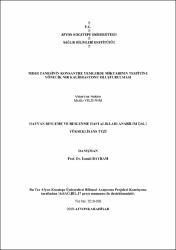Mısır tanesinin konsantre yemlerde miktarının tespitine yönelik nır kalibrasyonu oluşturulması
Özet
Bu araştırma tane mısırın yumurta tavuk yemlerinde kantitif olarak hangi oranda kullanıldığını yakın kızılötesi (NIR) cihazı yardımıyla belirlemek amacıyla gerçekleştirilmiştir. Bu amaçla tane mısır karma yumurta tavuk yemine %1’den başlayarak % 60’a kadar her bir rasyonda %1 artırılarak 1’er kg’lık karışımlardan oluşan 60 adet farklı yumurta tavuk karma yemi oluşturulmuştur. Yem karışımlarının fonksiyonel NIR spektrumları, 10000-4000 nm/cm dalga boylarında elde edilmiştir. Spektraların kendi içerisinde kalibrasyon ve validasyon setleri program yardımı ile ayrılmıştır. Elde edilen spektralar PLS (Partial Least Square) yöntemi ile ikincil türev üzerinden (second derivative) değerlendirilmiştir. Normalizasyon çalışması yapılan verilerde SNV (Standard Normal Variate) metodu uygulanmıştır. Ayrıca birinci dereceden türev alınarak (1st Derivation B Cap 5 Points Gap 2) veriler regresyona hazır hale getirilmiştir. Outlier değerleri kalibrasyon setinden çıkarılarak normalleştirilen spektralara lineer regresyon uygulanmış ve kalibrasyon kalite parametreleri ortaya çıkarılmıştır. Bu aşamada R2 değeri, Validasyon ve Kalibrasyon setinin standart sapmaları hesaplanmıştır.
Reflektanslara göre Regresyon Katsayıları ile elde edilen grafikler çıktı alınmıştır. Ayrıca validasyon setinin tahminleme rezidüal hatasının kareler toplamı da (V-Set PRESS) ortaya çıkarılmıştır. Outlier değerleri program tarafından belirlenmiş ve kalibrasyon kalitesini düşürmesinden dolayı çalışmaya dahil edilmemiştir. Araştırmada spektra seti olarak R değeri, 0.9985, R2 değeri, 0.9970, standart hata değeri ise, 0.9352 olarak tesbit edilmiştir. Elde edilen validasyon setinin tahminleme rezidüal hatasının kareler toplamı grafiği (V-Set PRESS) sayesinde temel bileşen değeri (Principal Components) 14 civarında olmuştur. Elde edilen regresyon tutarlılığı kalibrasyonun standart hata değerinin (SEC) tahminleme standart hatasına bölünmesi (SEP) sonucunda elde edilmiştir. Tutarlılık değeri 80 ile 110 arasında belirlenmiştir. Bu sonuçlar, NIR veya FT-NIR spektroskopisinin, tane mısırın yumurta tavuk yem karışımlarında kantitatif olarak hangi düzeyde katıldığının ayırt edilmesini öngörmede kullanılabileceğini göstermektedir. Bu nedenle sonuç olarak, karma yem karışımlarına giren her bir yem hammaddesinin yüzde olarak miktarını hızlı ve pratik bir yöntem olarak, FT-NIR spektroskopisi kullanarak kantitatif olarak tespit edilebileceği kanısına varılmıştır. This study was carried out to determine the proportion of corn grain used in laying hen concantrate feeds quantitatively by means of near infrared spectroscopy (NIR) device. For this purpose, different laying hen concentrate feed consisting of 60 pieces of 1 kg kg mixture was formed by increasing the concentration of 1% in each ration from 1% to 60% .Functional NIR spectra of feed mixtures were obtained at wavelengths of 10000-4000 nm / cm.The spectra were evaluated by using PLS (Partial Least Square) method on the second derivative. In the normalization study, SNV (Standard Normal Variate) method was applied. In addition, data obtained from first order (1st Derivation B Cap 5 Points Gap 2) were prepared for regression. Linear regression was applied to the normalized spectra by subtracting the Outlier values from the calibration set and calibration quality parameters were revealed. At this stage, the standard deviations of the R2 value, validation and calibration set were calculated. According to the reflections, the graphs obtained with Regression Coefficients were taken.In addition, the sum of the squares of the estimation residual error (V-Set PRESS) of the validation set was also revealed.
Outlier values were determined by the program and were not included in the study due to lowering the calibration quality. In the research, R value was determined as 0.9985, R2 value, 0.9970 and standard error value as 0.9352. The principal component value (Principal Components) is determined around 14 thanks to the sum of the squares sum of the estimation residual error (V-Set PRESS) of the validation set obtained. The obtained regression consistency was obtained by dividing the standard error value (SEC) of the calibration to the standard error of estimation (SEP). The consistency value was determined between 80 and 110. These results suggest that NIR or FT-NIR spectroscopy can be used to predict the extent to which the corn grain is quantitatively introduced in laying hen feed mixtures. As a result, it was concluded that the percentage of each feed raw material entering the concentrate feed mixes can be quantitatively determined using FT-NIR spectroscopy as a fast and practical method.
Bağlantı
https://hdl.handle.net/11630/6774Koleksiyonlar
- Yüksek Lisans Tezleri [646]



















